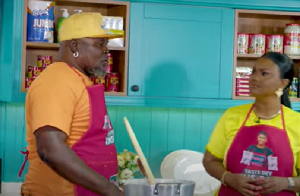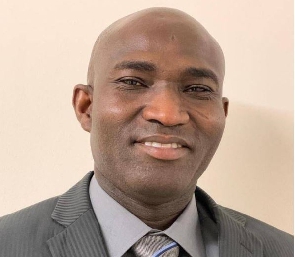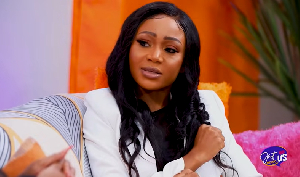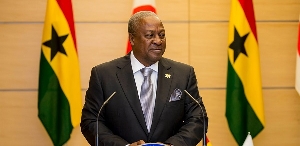WHY I WANT TO LEAD GHANA - TO THE NEXT LEVEL
A PUBLIC ADDRESS BY NANA AKUFO-ADDO, MP ALISA HOTEL, NORTH RIDGE, ACCRA, TUESDAY 28TH AUGUST 2007
Ladies and gentlemen of the media,
I am honoured and delighted by your presence here this evening. The Ghanaian media is a great credit to our nation, for by your collective activities you have created one of the most vibrant media in all of Africa, if not the world. The contribution that the media has made to the emergence and consolidation of our democracy is invaluable. And I would like to use the occasion of this platform to salute the persons whose courage and sheer devotion to nation enabled them to overcome the obstacles and difficulties that tyranny placed in their way, so that our people could enjoy the free, democratic atmosphere that now prevails in our country – John Kugblenu, Tommy Thompson, Charles Palmer Buckle, Kwesi Pratt, Kweku Baako, Kabral Blay-Amihere, Kofi Coomson and Eben Quarcoo, all stalwarts and heroes of our contemporary struggle for freedom. Some of them are here in this room. I am grateful to them for their continued solidarity and commitment to our common project of developing our nation in freedom. Ayekoo to all of you and to the new vigorous recruits that have joined you. And Ayekoo too, to the talented young journalists, Anas Aremeyaw Anas and Mathilda Asante, who swept this year’s GJA Awards.
Ladies and gentlemen, on the 5th of July last month, I tendered my resignation as Foreign Minister. Upon directive, I stayed in office until 31st July when the processes for the assumption of office by my successor, my able Deputy and good friend, Hon Akwasi Osei Adjei, MP for Ejisu Juaben, were completed. I thank the Ghanaian people, the New Patriotic Party, Parliament, and the President of the Republic, His Excellency John Agyekum Kufuor, for giving me the opportunity to serve our nation in these last six and half years in two of the great offices of state, Attorney-General and Foreign Minister. In each, I have given of my best in the public interest. The experience has been great, one which I hope will prove useful in the higher calling to which I aspire.
I left office in order to contest to win the NPP presidential nomination for the singular opportunity to serve the people of Ghana as their next leader. I come from a background where public service is considered a duty, and where privilege and good fortune demand even greater commitment to the common good. Generations of my forebears and relations established this rich tradition of public service, of which I am proud and which has been the source of constant inspiration.
I am fully aware of the responsibility the job of leader brings as I am fortunate enough to carry a sense of the history and struggles that made that job possible as well as apprised of the challenges and opportunities of the future. Crucial to this future, is how to unleash energies to broaden the horizon and to realise the hopes of every man, woman and child in Ghana.
Who has the leadership qualities necessary to protect and move forward this extraordinary nation in the next chapter of its progress? Who can lead us to take the next bold steps towards the prosperity and general well-being of every citizen of Ghana?
The first focus for those of us in the NPP is 22nd December, 2007 when the Party’s 2008 Presidential Candidate will be selected by the National Congress.
Last week, I completed my nation-wide consultations with the rank and file of the Party - the renowned “water-testing” exercise, so described by our National Chairman. I began that first tour of all 230 constituencies of the country in the Upper East Region on Sunday, 23rd July, 2006. And on Thursday, 23rd August 2007, I wrapped up the first national tour of this campaign in the Eastern Region. I am pleased to announce that we received a warm and encouraging welcome, indeed, in many places, what I can only describe as an overwhelming one.
As we celebrate the 15th anniversary of the NPP, I want to thank the grassroots activists of the Party for their continuing solidarity with my person. In many, many places I was met with the cry: Nana, yenim wo firi tete. I want to thank my campaign team and the thousands of volunteers in every polling area of the country who are canvassing support for me. I want to thank all those who are working long hours for me – and, by extension, for the good of the Party.
At Regional and Constituency Offices of the Party, I listened to members’ accounts of the opportunities and challenges facing our great Party and shared ideas on how best to improve the Party’s fortunes in every corner of the country. I returned to my constituency, Abuakwa South, assured by the Party rank and file that come the hour, delegates of the National Congress will do what they have steadfastly done since August 1992, which is to assert their wisdom and the supreme authority granted them by the Party’s constitution, and vote for the most appropriate person to lead the Party into victory in December 2008 and the nation into more victories after January 7, 2009.
The December Congress of the Party will be a unique one in the Party’s history, for it will be the first time that the selection of the leader will be taking place when the Party is in power with a sitting President. The National Council is thus working out clear modalities that will bind all actors to ensure that the Party maintains its sovereignty in the choice of leader and does not become an appendage of the Executive. This is the best way of safeguarding the Party’s democratic culture and heritage.
After thirty years in frontline politics, the more I travel around the country canvassing for votes, the more I see the urgency in waging and winning the war against poverty. To achieve social justice for every Ghanaian, whether rural or urban dweller, the only logical step to the next level is to intensify our efforts in pursuing a development agenda that is broad-based, inclusive and sustainable. If a free society cannot help the many who are poor, it cannot save the few who are rich. Fairness is essential or we cannot play ball at all. All Ghanaians have a right and duty to engage in and profit from the country’s economic growth.
Thankfully, the NPP has shown, through our policies in education, health, youth employment, small loan schemes, to name a few, that we fully subscribe to the notion that government has a responsibility to provide all its citizens with skills and opportunities to create their own wealth.
We must continue to renew trust in our democracy.
The philosophy and programmes of the NPP remain the most formidable proposition in the political market of our country. In the eyes of the great man who founded our tradition, Joseph Boakye Danquah, a property-owning democracy for a free, independent Ghana could never mean luxury for an elite at the expense of the poor. His vision was to spread the benefits of private ownership to the majority of citizens, not just a rich and privileged few; to democratise the opportunity to accumulate capital as the surest way of ensuring the dignity of each individual. This is why the policy of the NPP government has been to clear the ground for the purpose of inviting every Ghanaian to climb the ladder of competitive achievement. Without many players, markets fail to deliver quality at the best price. Without everybody on board, our democratic ship risks sinking under its own domestic weight.
What we need is a political economy that serves our people, by building a strong bridge from the times when big government did everything, to a future when people are entrusted with self-governance. We need to follow the wisdom of our forefathers; we need to mould our economic system to our particular instincts for individual freedom and social justice. Hence, Danquah’s insistence that the purpose of governmental action should be to enhance “the life, liberty and property of each and every citizen”.
There are no short-cuts for Ghana. Only hard work, creativity and a sense of enterprise can produce the accelerated economic development that will bring to all Ghanaians the basic deliverables they so richly deserve from their Government, namely, the very best of public services, including an effective, humane healthcare system, access to a secure and reliable justice system and access to a quality education in Ghana that rivals any in the world.
But we cannot get anywhere without sufficient financial resources. And to grow these financial resources, we need to look more and more to ourselves within Ghana and among Ghanaians in the Diaspora than we have in the past. We need to develop and pursue a clear policy of Ghanaian Economic Empowerment.
To do so, we should not be shy of introducing policies that look, first and foremost, after our own people at every level of our economy. We must pursue a proactive but pragmatic agenda by picking, stimulating and increasing the number of Ghanaian winners in all sectors and build champions of industry who can compete anywhere in the world. We do so not by turning our backs on the process of globalisation, but by making use of its rules and regulations in such a way as to enhance our capability and capacity. We should be bold and devise and push an agenda that gets people out of the cycle of subsistence wages and informal, ad hoc economic activities, into the formal sector.
I believe in leading by example. I believe in the cohesive richness and the manifest destiny of this great nation’s diversity. I believe in the can-do spirit of our people. I believe in Ghana.
I believe in hard work, in service to nation. I believe we can defeat mediocrity. We are a peace-loving people, who are among the best people on this planet. I believe in Ghana.
I believe in the Constitution and the indigenous democratic heritage of Ghana. I believe in the rule of law and justice for all, regardless of status. I believe in rewarding those who play by the rules, and giving credit to high achievers. I believe in freedom, and a sense of national responsibility. I believe in competition. But, I also believe in the economic empowerment of the Ghanaian and Ghanaian economic operators as a deliberate policy of government.
I believe in equal opportunity and in a fair deal for everyone. I believe in caring for the vulnerable, in a society that respects everyone. I believe in the Ghanaian, as a leading citizen of an integrated, united Africa. And most of all, I believe in God.
Ladies and gentlemen, let me focus on the immediate task ahead, that of winning the NPP nomination for the next Presidential Candidate. In my mind, there are five qualities which delegates should focus on when they choose a Presidential Candidate (i) Record of Active Work for the Party (ii) Ability to Unite the Party (iii) Capacity to Win the Presidential Election (iv) Leadership Qualities (v) Vision.
• First, a well-known, committed party activist and loyalist can more easily command the respect and admiration of the Party’s foot soldiers, who are working in their various communities to get the Party and its candidate elected. My record as an activist of the Danquah-Busia tradition since the mid-1970s and my work for the Party, beginning as its first National Organiser in 1992 to date, speaks volumes of my commitment, contribution and devotion to the cause of the Party, through thick and thin.
• Party unity is the second key to unlock a strong victory. After the winner is announced on December 22nd, the party will need to come together quickly and bring on board as many opponents and undecided voters as possible to build a strong united front for the December 2008 general elections and beyond. If the NPP is to be the party of national development it has to be the party of national unity, with the unity coming out of itself and it must eschew religious, ethnic or regional divisions. If the NPP is to promote national reconciliation, it has to promote reconciliation within itself. We must guide against factionalism. If I am given the nod as the Party’s flag bearer, all party members will be treated alike, whether or not they voted for me.
• Thirdly, the Congress has to nominate a winner. A respected political leader who is also competent, courageous, well known and popular, someone with extensive exposure, a diplomat around high negotiation tables. A politician who can be confidently marketed with ease for the general elections, and then for global consumption, in the highly competitive trans-national arena. A winner will mean choosing a Presidential Candidate who has an extensive knowledge of the electoral terrain in Ghana. A person who has a rich experience in competing in and winning elections. I believe I fit this bill fully.
• The decision in December is about the choice of a political leader. Running a whole country is not the same as running a ministry of state. It calls for more than efficiency, hard work and good managerial skills. It requires that elusive thing called true leadership. The next President of the Republic must have an impressive record of political leadership, both domestic and global. In all humility, I can say that my entire career in politics has been about leadership. I have been in the frontline in the struggle against military dictatorship and the fight for democracy in Ghana and in the development and promotion of the Party. I have also been prominent in pushing the Ghanaian and African agenda on the world stage.
• Finally, that political leader must be able to articulate a vision that Ghanaians across party lines and beyond can confidently lock into and follow to the next exciting level of our development journey.
The next NPP flagbearer must have the courage, confidence, competence, restraint, judgment, balance and purposefulness to be an executive leader. But I concede that personal attributes and noble intentions can never, on their own, be adequate to develop our post-HIPC economic situation. It requires more than old age, party loyalty, charisma, eloquence, acclaimed youthfulness, good looks or campaign cash to win elections to lead a country.
The next leader must be able to stand and fight legitimate causes for both party and country. We need a leader who can transform the ideas and hopes of every man and woman of this country into our new reality, a reality where we stand erect as a nation together, on our own two feet.
The mission of the NPP is straightforward and simple: we mean to create a future Ghana that will provide a model of progress for the rest of Africa and the world. To paraphrase the words of that legendary figure, our first President, Kwame Nkrumah, we see a future in which Ghanaians will show to the world that the African is capable of more than managing his own affairs. Ghana’s next step requires that we share a vision that takes us well beyond our immediate identities, to recognize Ghana’s significance as the star of Africa on the world economic, political and sporting stage.
Today’s global city needs masters of commerce, whiz kids of technology and the genius of diplomacy to keep it working harmoniously. Ghana cannot afford to be left out. Thus, the Head of State must be able to understand and withstand the battle of words in the global marketplace of discourse abroad and draw from that rich experience to drive his people to get actively involved in the competition.
The next leader has no choice but to continue to usher Ghana forward as a nation where rights and responsibilities are instinctively respected; a Ghana where rules and regulations are humanely but strictly enforced; a Ghana where the whole nation will make a determined effort to bring quality and excellence to her development.
We must focus on excellence, the excellence that led us to the top of the global charts in cocoa exports, in tropical medicine, in educating our people once upon a time and more recently in global diplomacy.
Slavery, colonialism and globalisation have one thing in common – they exploit those who are weak but are rich in resources. They exploit those who allow others to determine their lives and their value as means to ends. We are resourceful people from a rich land. We have no reason to allow anyone to determine our goals and our policies. Our generation of Ghanaians and Africans must refuse to be victims of globalisation and become its beneficiaries and masters.
Let me say something about my view of the crucial role that the media must play in all of this. The diversity and free flow of news and information are fundamental to the workings of democracy. I wish to thank you, the journalists of this country, for keeping our government accountable. It is the press and other media that have taught our people to become more and more discerning and vocal and questioning as a civic public. We made the repeal of the Criminal Libel Law one of the first duties of the NPP government in 2001 because we believe a vibrant and unfettered media is the only way to hold Government and society to the highest standards of honesty, self discipline and delivery. I am proud of the modest role I played in the process of repeal as the Attorney-General who piloted the repeal through Parliament and was responsible for the discontinuation of the prosecution against my good friend Kofi Coomson and others.
So, while a government may struggle to fulfil the promises of prosperity quickly enough to forestall agitation and dissent, a government must never fear dissent. Agitation and dissent are healthy – this is the fuel, the power of the people’s voice and the channel of communication between the elected and their representatives that keep democratic institutions running well.
The NPP is a great party. We have achieved a lot. Seven years ago, many members of the vocal public said we couldn't win the elections in December 2000... And yet we did it. They said President Kufuor’s government would not last six months... And yet he won a second term in 2004. Today, we are the largest and fastest growing party in the country. We have the largest and fastest growing political youth organisation in the country.
Under seven years, the Ghanaian economy has grown from a GDP of $3.9 billion to a GDP of over $13 billion today. To put it in perspective, when we left behind the Gold Coast 50 years ago we had a population three and a half times less than today, and a GDP of some $2.5 billion. According to the latest statistics, we have succeeded in reducing poverty to 33.4 percent in 2005, down from 39.5 percent in 2000, and 51.7 percent in 1990. Those statistics, combined with strong improvements in business climate and the democratic process, civil liberties and freedom of the press, indicate that Ghana may be able to halve poverty before 2015. This is significant, relative to our own modest past performances and that of our region. Still, this does not measure up to the goals that we have set ourselves.
The future economy requires not only knowledge, skill and technology, but also a body politic founded on the NPP doctrine of development in freedom, which secures the principles of democratic accountability, respect for human rights and the rule of law.
I believe that if Government focuses on what it is elected to do – providing leadership and good public services – the Ghanaian will be free to go about his or her lawful business. We do not believe in taking power away from people. We trust that people are capable of managing their own affairs, if only politicians will trust them to do so. Our job as politicians is to ensure that the state provides the people with a quality environment of law and order, physical infrastructure, social services, sensitivity and quick responsiveness to needs, and a regulatory environment that allows free and fair competition. These are policies that make lives better. These are policies that underpin the NPP’s vision of development.
The task ahead is more than just creating jobs. It is also about building a competitive economy with a competitive work force. As I see it, the task is also to get Ghana thinking… thinking out of the box… thinking big…and thinking deeply about the little things we do or don’t do that hold us back.
In December 2008, the NPP will have the advantage of riding on the impressive record of the Kufuor Government. However, facing an Opposition determined to return to power after nearly a decade in opposition, the NPP cannot go into the future race blind to the need to present the twin requisites of a well-organised, motivated party, and a winnable Presidential Candidate. The two must go together to ensure victory.
Beyond that, as a country, we must have the pride to acknowledge that we have made great strides. Yet, we must also have the humility to appreciate that we still have a long way to go. We must have the patience to accept that just as democracy was not built in a day in Ghana, so too national prosperity will not come overnight. The key is to have the courage and faith to press on and with urgency.
For my part as a leader, I shall lead by continuing to be a good listener. I promise to listen to voices great and small, near or far, and friend or rival. But, after all is said, I can assure you that I shall act decisively and with firmness.
Let me end by stressing that I have every confidence in the integrity and wisdom of the delegates to my Party’s Congress. Come December 22nd, 2007, the delegates will vote ‘one touch’ for the candidate who can win the presidential election in December 2008. They will choose one who will be able to lead and take Ghana to the next level of her development – a self-reliant, independent, free, prosperous Ghana -- which will be able to make her own unique contribution to the growth and development of Africa and the world.
I hope that the delegates in December will see that leader in me, Nana Addo Dankwa Akufo-Addo.
God bless all of us and may God continue to bless Ghana.
Thank you.
Click to view details



Politics of Wednesday, 29 August 2007
Source: --
















